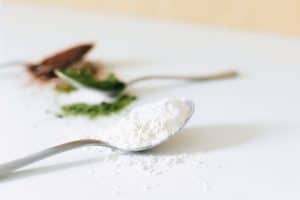If you’re feeding formula to your baby, you obviously would want to know how many cans of formula per month are needed.
Although the baby formula contains healthy nutrients for the baby, it’s best not to overfeed your little one with excess formula.
Also, considering most baby products are costly, it’s reasonable enough to feed your baby sufficiently. So, how many cans of formula per month?
Read on to gather insightful information on the quantity of formula to feed your baby and how the demand for formula changes as they come of age
How Many Cans of Formula Per Month?
Different brands available in the market offer almost the same quantity of formula in the can.
Go through the instructions and ingredients printed on the label.
You should be well informed about the quality and quantity of ingredients present in the formula.
So, how many cans of formula per month?
A single can contain 12.5 oz of formula, which is meant to last for at least 3-4 days for a 0–2-month-old infant.
You will need at least 13-14 cans per month for an infant of 2-4 months of age. An infant can last up to 2-3 days if you’re not breastfeeding your little one.
For an infant more than six months of age, your formula will last up to 2-3 days. Bulkier cans of 30 oz or 35 oz are meant to last longer.
Between the age of 6month to 1 year, you’ll be breastfeeding less. This means that you’ll be needing more of the formula.
For this time period, you should purchase a 30 oz or 35 oz can. So, on average, you will need only four cans per month as these bulky cans will last longer.
So, according to your requirement, you’ll be deciding whether you need a 12oz can or a bulkier one.
1. Baby’s Age
Your baby’s age is also a determining factor in how many cans of formula per month. A newborn won’t need much feeding because of their tiny bellies.
The rule of thumb is to feed an infant more than 2 ounces of formula after 3 hours or when they show hunger signs.
In most cases, newborns feed 8 to 12 times a day, meaning they might consume 24 ounces of infant formula.
With these details, it will be more streamlining to know how many cans of formula per month. As your baby matures, their belly grows too, and they will need more formula feeding.
Also, after six months, when your doctor gives the go-ahead to feed your little angel solids, the amount of formula they need will be less.
2. What Quantity Of Formula In A Bottle?
We already know how many cans of formula per month you need. So, let’s see how much quantity of formula you should put in a bottle according to your baby’s age.
You already know a growing baby will need more food as he’s undergoing the process of growth.
Here are some estimated quantities of baby formula that you should include in a single feed:
- From 0-2 months, you must put 1-3 oz of the formula in a single feed. Feed him after every 3 to 4 hours.
- From 2-4 months, you must put 4-6 oz of the formula in a single feed. Feed him after every 4 to 5 hours.
- After 6+ months, you must put 6-8 oz of the formula in a single feed. Feed him less than 36 oz of the formula in a single day.
3. Can The Baby Formula Spoil?
Of course, it can! It is just like most other edible items that can spoil when not kept in proper conditions.
Listen closely; whether you’ve opened the can or not, the formula can spoil.
So you wouldn’t want to waste your precious money by throwing the spoilt formula away.
Therefore, it’s essential to know how many you will need in a week or a month.
When the can of formula is left out, it will last for only a few hours. Hence, you should keep the bottle in a refrigerator. When cooled, it will last up to 48 hours.
Editorial Pick: Can You Use Baby Formula After Expiration Date?
4. How Long Will A Prepared Formula Last?
The formula, when mixed with water, is expected to last for only 2 hours. However, some brands say that the formula will last only 1 hour if kept at room temperature.
Therefore, it is better that you prepare the formula only when you feed the baby. Otherwise, simply store the can of formula in a refrigerator.
If the prepared formula is kept in a refrigerator and left undisturbed, it will last up to 24 hours.
When storing the formula in a refrigerator, make sure that the temperature is 40 degrees Fahrenheit or less.
Summary
Now you know how many cans of formula per month are needed. So, purchase the cans according to your requirement. Keep in mind the expiry date of the cans of formula.
If you purchase the cans in bulk, make sure that you store them under ideal refrigerating conditions.
Most importantly, if you have concerns about your little one’s growth or the amount of formula they are taking, always consult a pediatrician to get the correctfacts.
Related Posts:
Frequently Asked Questions (FAQs)
How Much Formula Is Healthy For The Kids?
Usually, it is suggested that you put 2-3 ounces of the formula in a single bottle for babies who’re 0-2 months old.
Then, increase 1 ounce of the formula after every month in a single feed. A maximum of 7-8 ounces of formula is proven healthy for growing kids.
Are Formula-Led Babies Healthy?
For moms who do not breastfeed either by choice or because of some physical pains, the formula is the best alternative they’ve got.
Baby formula is considered to be a healthy alternative to breast milk. But you should not be dependent on the formula.
How To Extract Maximum Benefit Out Of The Formula?
If you don’t want the formula getting spoilt, you should only mix it with water when you’re going to feed the baby.
Keep the can and the prepared formula (if leftover) in the refrigerator so that it may last up to a few hours or days.
How Much Formula is Enough for Newborn?
A newborn can consume 1 to 2 ounces of infant formula after a 2 hours interval. If your little one is only getting formula, feed your baby more when they display hunger signs. In most cases, newborns will feed 8 to 12 times a day.

Iesha is a loving mother of 2 beautiful children. She’s an active parent who enjoys indoor and outdoor adventures with her family. Her mission is to share practical and realistic parenting advice to help the parenting community becoming stronger.


